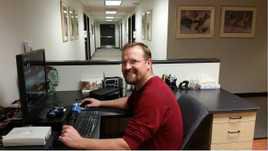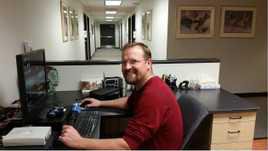Anyone who is wondering if sleep apnea may be the cause of a bad night’s sleep might be able to find answers with a home-testing device from Hays Medical Center.
“HaysMed recently began offering this service, which has already become popular,” said Bryan Noone, R.N., manager of the hospital’s Sleep & Neurodiagnostic Institute.
“The institute is accredited by the American Academy of Sleep Medicine, which serves as a benchmark for quality,” said Noone, a registered polysomnographic technologist.
HaysMed voluntarily sought the accreditation.
“While some patients have their sleep study performed in our lab, those who might have obstructive sleep apnea may be eligible for the home test,” Noone commented. “This involves a small device they wear at home and return to us; it is specifically designed for diagnosing this condition.
“Our sleep physician will determine if it is highly likely you have moderate to severe sleep apnea,” he continued. “If you have no other significant medical conditions, the device may be the answer.”
Sleep apnea is a potentially serious sleep disorder that causes breathing to stop and start repeatedly.
Noone, who also is a registered sleep technologist, emphasized that a home test is not designed to diagnose other sleep disorders.
Testing for those conditions usually is performed at the institute. For example, a daytime nap test could be used to diagnose narcolepsy.
“Another test is designed to document the effectiveness of treatment and measure a patient’s ability to stay awake,” Noone said. “This is important for people in occupations such as commercial driving and aviation.”
Other services include patient education about sleep issues, which Noone said could be the most valuable service the institute provides.
“We love to help folks having sleep problems,” Noone explained. “Sometimes the answer is as simple as suggesting changes in their habits, which can dramatically improve the situation.”
“Anyone who is hesitant to be tested at home or the institute should consider the importance of getting a good night’s rest,” Noone added.
“Just think about the amount of time you spend sleeping,” he elaborated. “By the time you are 60, you should have spent about 20 of those years asleep. It is as vital to overall health as a balanced diet and exercise.”
Chronic sleep loss can lead to an increased risk of diabetes, heart disease, high blood pressure and stroke. It also can cause mood swings, and a decreased ability to handle stress, anxiety and mental exhaustion.
“We also know that memory consolidation and physical healing of the body take place during sleep,” Noone said. “A good night’s sleep just makes us feel good.”
Noone also pointed out that the institute’s accommodations are comparable to a hotel room. Each room has a full-sized, adjustable bed, and a recliner, television and DVD player.
“We also offer Wi-Fi for those who want to bring a laptop or tablet,” he said. “Although we are a hospital-based service, we try to keep it as un-hospital like as we can.”
Dr. Ted Daughety, who has more than 25 years of experience treating sleep patients, is the medical director at the institute. He is board certified in sleep medicine, critical care and pulmonology. Dr. Daughety is in the clinic regularly, along with Rhonda Schenk-Pitts, advanced practice registered nurse. A physician’s referral is necessary for sleep testing at home and at HaysMed; insurance often covers most services.
For more information, contact the institute by calling 785-623-5373.
HaysMed institute offers sleep apnea home test, other services





